Behind the latest diet and health news
Another day, another study. The media can’t resist reporting the latest diet and health news, no matter how preliminary. Many reporters only read a press release about a study. They can’t tell how solid it is or if better studies disagree. If it’s click-worthy, it’s news.
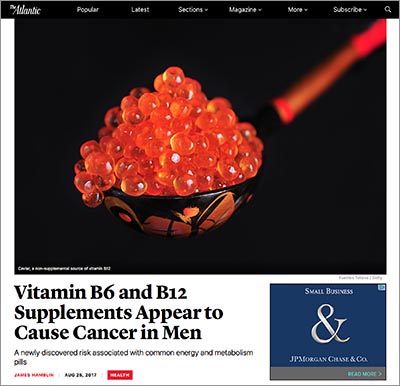
“If you’re not taking vitamin B12, forget about having energy,” the Atlanticarticle facetiously explained. And “if you want to ‘supercharge your metabolism and energy levels,’ Amazon can deliver you a tall bottle of B12 supplements by the end of the day.”
Kudos to The Atlantic for skewering the baseless “energy” and “metabolism” claims used to sell B vitamins.
But the study that led The Atlantic to declare that B vitamins “appear to cause cancer in men” doesn’t hold a candle to far better evidence that B vitamins, even at high doses, don’t cause cancer.
The new study found that men (but not women) who reported taking vitamins B-6 and B-12 (at doses higher than typically found in a multi) had a higher risk of lung cancer.1 But a single study of that kind can’t prove cause and effect, since something else about the vitamin takers could explain their higher risk.
In contrast, randomized controlled trials can prove cause and effect. And in 2010, researchers examined eight trials that gave large doses of B vitamins to more than 37,000 people at risk for heart attack and stroke, typically for five years.2 (All eight trials tested folic acid, seven also tested B-12, and six tested B-6.)
The difference in overall cancer rates between B vitamin and placebo takers? Zip.
In 2013, researchers looked at 13 trials—including 10 that tested B-12 or B-6—on nearly 50,000 people. Again, they saw no difference in cancers of the lung, breast, prostate, colon, or other organs.3
Bottom Line: Don’t expect B vitamins to boost your energy, your metabolism...or your risk of cancer.
1J. Clin. Oncol. 35: 3440, 2017.
2Arch. Intern. Med. 170: 1622, 2010.
3Lancet 381: 1029, 2013.
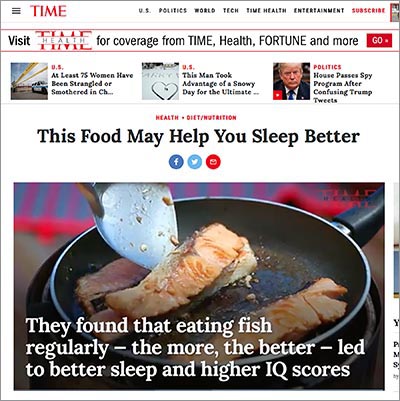
“Forget warm milk. A new study from the University of Pennsylvania says that fish may be the key to a good night’s sleep,” reportedTime in December.
And it’s not just sleep. “Eating fish just a few times a month may improve your brain functioning,” one of the study’s authors told Time.
What’s the source of those rather extravagant promises?
“The researchers asked 541 schoolchildren in China between ages 9 and 11 to describe their eating habits, including how often they ate fish,” explained Time. The parents answered questions about their kids’ sleep.1
The study “found links between eating fish regularly—the more, the better—and both improved sleep and higher IQ scores,” reported Time.
Hello? Could something else about the kids or parents have explained the higher IQs or (according to the parents) better sleep? The study took some things into account, but didn’t even look at what else the children ate beyond fish.
Bottom Line: Preliminary studies like these only make headlines because we all want to sleep well and stay sharp.
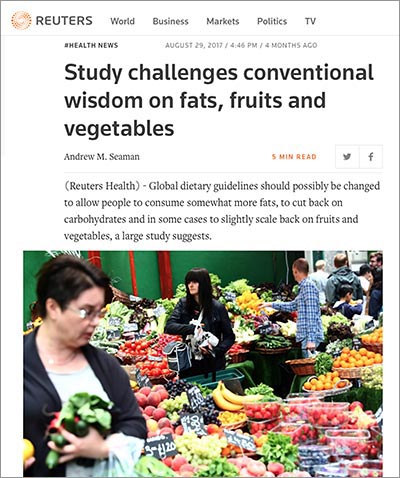
"Global dietary guidelines should possibly be changed to allow people to consume somewhat more fats, to cut back on carbohydrates and in some cases to slightly scale back on fruits and vegetables, a large study suggests,” Reuters reported in August.
Really?
The study sounded impressive. “The new data are drawn from the Prospective Urban Rural Epidemiology (PURE) study, which recruited people ages 35 to 70 in 18 countries,” said Reuters. That’s 135,335 people, who were followed for seven years.
One problem: most of the 18 countries were low-income (like Bangladesh, India, and Zimbabwe) or middle-income (like China, Malaysia, and Turkey). With only three high-income countries (Canada, Sweden, and the United Arab Emirates), you have to wonder: Does that mean we should eat more fats and fewer carbs?
The PURE participants who got 77 percent of their calories from carbs were more likely to die during the study than those who got 45 percent.1 But Americans average 48 percent, which puts us roughly in PURE’s less-likely-to-die group.
Likewise, the PURE participants who got 11 percent of their calories from fat were more likely to die than those who got 35 percent. Americans average 34 percent of calories from fat, so again, we’re hitting PURE’s lower-risk spot.
The bigger question is: Who were the PURE participants who got 77 percent of their calories from carbs and only 11 percent from fat? Were they subsisting largely on white rice? Were they unable to afford other foods?
If so, what do the PURE results have to do with Americans, who are at risk not from impoverished rice diets but from meat-lover’s-pizza, bacon-cheeseburger, loaded-fries diets?
(The authors don’t say what the high-carb, low-fat eaters were more likely to die of, other than that it was not cardiovascular disease, the leading killer of Americans.)
And who knows what the curious results on fruits and vegetables mean.2
“Our findings show the lowest risk of death was among people who ate three to four servings with little additional benefit beyond that range,” a study author told Reuters.
However, she added, “We don’t want to tell people who are eating more than the recommendation to eat less.”
Glad to hear it.
Bottom Line: Ignore studies about people whose diets are vastly different than ours.
1Lancet 390: 2050, 2017.
2Lancet 390: 2037, 2017.
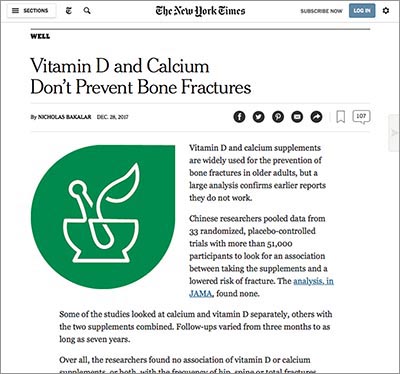
"Vitamin D and calcium supplements are widely used for the prevention of bone fractures in older adults, but a large analysis confirms earlier reports they do not work,” declared the online edition of the New York Times in December.
Whoa. In one terse, nine-sentence article with hardly a caveat, the Times reported on a meta-analysis—a compilation of earlier trials, not a large new one—as if it were an end-of-discussion, nail-in-the-coffin finding.1
The LA Times and some others were more cautious. “Calcium and vitamin D supplements may not protect against bone fractures,” reported the Washington Post. (Even the print edition of the New York Times had a more nuanced headline.)
In fact, the results of a meta-analysis aren’t as cut-and-dry as they may seem. A key question: Which studies to include?
For example, did it make sense for the new meta-analysis to exclude a large trial on nursing home residents? (Calcium plus vitamin D lowered the risk of fractures in that trial.)
What about a trial in which nearly half of the women in the placebo group were taking calcium and vitamin D on their own? Or a trial in which more than a third of the participants stopped taking their calcium and vitamin D after two years? (Both stayed in.)
Doing a meta-analysis is easy. Translating the often imperfect body of evidence into advice for the public is hard.
So far, the best advice—from the National Osteoporosis Foundation and others—is to take a calcium and vitamin D supplement only if you get too little.
Bottom Line: Take a supplement only if you get considerably less than the Recommended Daily Allowance for calcium or vitamin D (see Jul./Aug. 2017).
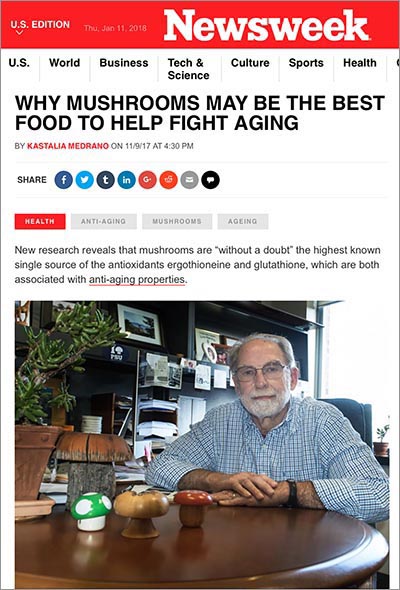
“Mushrooms, like the kind your local pizza delivery lays beneath gooey, drool-worthy layers of cheese, contain high concentrations of rare anti-aging compounds,” reported a Daily Meal article in the LA Times in November. Porcini mushrooms, noted the article, helps “stave off aging the best.”
Newsweek also bit. “Why mushrooms may be the best food to help fight aging,” ran its headline.
At least Newsweek included a “may.” But it also implied that ergothioneine and glutathione, the “anti-aging” antioxidants in mushrooms, could do more than prevent wrinkles.
“It’s preliminary, but you can see that countries that have more ergothioneine in their diets, countries like France and Italy, also have lower incidences of neurodegenerative diseases, while people in countries like the United States, which has low amounts of ergothioneine in the diet, have a higher probability of diseases like Parkinson’s Disease and Alzheimer’s,” explained study author Robert Beelman, professor emeritus of food science and director of the Penn State Center for Plant and Mushroom Products for Health.
And damage from the free radicals that antioxidants quell is linked to cancer and heart disease, he added.
But it’s a big leap from finding antioxidants in a food to showing that eating the food prevents, well, anything. And the researchers tested only one sample of porcini mushrooms.1 Talk about preliminary.
Bottom Line: Enjoy mushrooms, but beware of media reports about the latest superfood.
1Food Chemistry 233: 429, 2017.
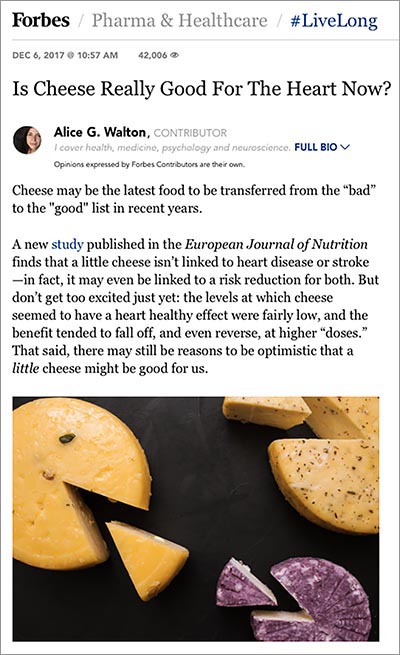
“Cheese may be the latest food to be transferred from the ‘bad’ to the ‘good’ list in recent years,” opined the article in Forbes.
What prompted that news?
A team of researchers “from China and The Netherlands looked back over data from 15 earlier studies, which together included over 200,000 participants,” explained Forbes.
Sounds impressive. But like any meta-analysis, what comes out is only as good as what goes in.
Some of the 15 studies were under-adjusted—that is, they ignored smoking, weight, exercise, history of heart disease, diet, drugs, and other factors that could affect risk.
Others were over-adjusted—for example, some essentially compared people with the same blood cholesterol levels, which would wipe away any impact of cheese on risk.
Nevertheless, the studies all got thrown into the same pot.1
The results of the meta-analysis: “...a little cheese isn’t linked to heart disease or stroke—in fact, it may even be linked to a risk reduction for both,” reported Forbes.
That must have pleased the three study co-authors who work for Yili, a giant Chinese dairy company. (Last year, Yili toyed with the idea of buying Stonyfield.) Forbes forgot to mention that link. So did Time and Cooking Light.
Nor did Forbes mention that many of the other studies it cited—all with good news about cheese—were funded by the dairy industry. Oops.
To its credit, Forbes did note several caveats about the meta-analysis.
But Forbes’s bottom line should please Yili: “Cheese, in modest amounts, may join the likes of butter, coffee, (dark) chocolate, and eggs in losing their ‘unhealthy’ status.”
That’s just what readers—and the dairy industry—want to hear.
Bottom Line: Replace some cheese and other foods that are rich in saturated fat with soy, fish, nuts, and other foods that are rich in unsaturated fats.
1Eur. J. Nutr. 56: 2565, 2017.
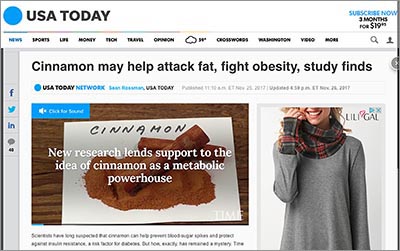
"University of Michigan research fi nds an essential oil in cinnamon attacks fat cells and could be used as a treatment to fight obesity,” reportedUSA Today in November.
Attacks fat cells? That’s a rather creative way to describe what happened when the researchers added the cinnamon’s oil to test tubes that were holding fat cells.1
“The research found the oil cinnamaldehyde boosts metabolic health by prodding fat cells to start burning energy—a process called thermogenesis,” explained USA Today.
The fat cells started burning energy? Not quite.
“The results found an ‘increased expression’ of genes and enzymes that boost metabolism while increasing proteins beneficial to thermogenesis,” said the newspaper.
In fact, the researchers were trying to find out how cinnamaldehyde might boost fat burning. Whether—and if so, how much—that happens in people is still unclear.
Bottom Line: Cinnamon oil—not the sprinkle of cinnamon on your cappuccino—could someday turn out to boost fat burning. But it’s a long way from test-tube research to a magic bullet to fight obesity. And despite other media reports, cinnamon doesn’t lower blood sugar in well-controlled studies (see Jun. 2017).
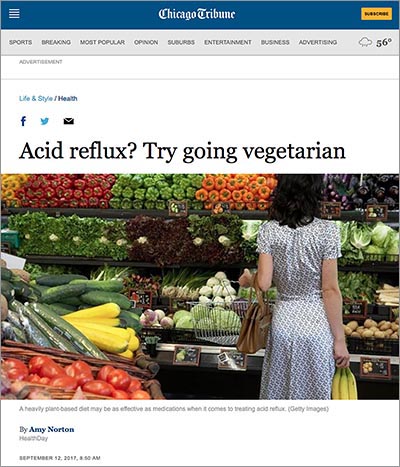
“A mostly vegetarian diet may provide relief similar to widely used medications for people with acid reflux, a new study suggests,” reported a HealthDay article in the Chicago Tribune in September.
The study looked at people with laryngopharyngeal reflux.1
“It’s a condition where stomach acids habitually back up into the throat, and it’s distinct from the much better-known gastroesophageal reflux disease (GERD) or what most people call heartburn,” explained the Tribune.
Instead of heartburn, patients “have symptoms like hoarseness, chronic sore throat, persistent coughing, excessive throat clearing and a feeling of a lump in the throat.”
Did the researchers randomly assign reflux patients to either a mostly vegetarian diet or to the PPIs (proton-pump inhibitors) that are widely used to treat GERD?1 Not exactly.
Instead, they simply looked back at the medical records of 184 patients treated by the lead author, otolaryngologist Craig Zalvan. He had prescribed PPIs to roughly half of those patients (between 2010 and 2012), and a mostly vegan diet—with only two or three servings of meat or dairy per week—to the other half (between 2013 and 2015).
“After six weeks, 63 percent of patients on the diet were showing at least a 6-point drop on a scale called the reflux symptom index,” reported the Tribune. “That compared with 54 percent of PPI patients.”
The Tribune neglected to mention that the difference wasn’t statistically significant.
And who knows what to make of the results? Would patients say they felt better with any diet recommended by their doc?
Bottom Line: If you have laryngopharyngeal reflux, it can’t hurt to try a mostly vegetarian diet, but this study doesn’t offer much evidence.
Continue reading this article with a NutritionAction subscription
Already a subscriber? Log in

